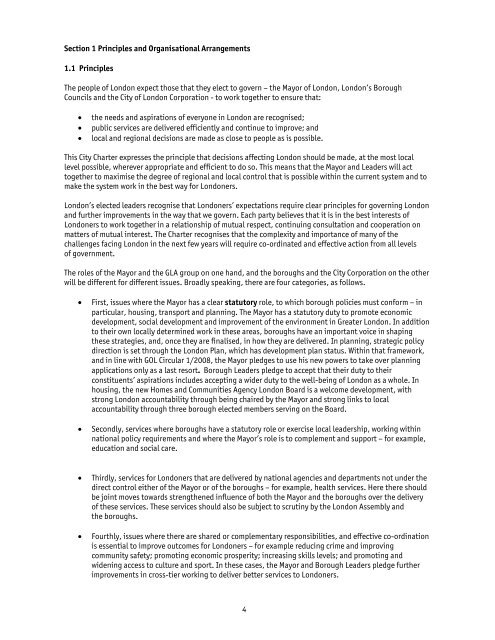London City Charter - PDF - london.gov.uk - Greater London Authority
London City Charter - PDF - london.gov.uk - Greater London Authority
London City Charter - PDF - london.gov.uk - Greater London Authority
Create successful ePaper yourself
Turn your PDF publications into a flip-book with our unique Google optimized e-Paper software.
Section 1 Principles and Organisational Arrangements<br />
1.1 Principles<br />
The people of <strong>London</strong> expect those that they elect to <strong>gov</strong>ern – the Mayor of <strong>London</strong>, <strong>London</strong>’s Borough<br />
Councils and the <strong>City</strong> of <strong>London</strong> Corporation - to work together to ensure that:<br />
• the needs and aspirations of everyone in <strong>London</strong> are recognised;<br />
• public services are delivered efficiently and continue to improve; and<br />
• local and regional decisions are made as close to people as is possible.<br />
This <strong>City</strong> <strong>Charter</strong> expresses the principle that decisions affecting <strong>London</strong> should be made, at the most local<br />
level possible, wherever appropriate and efficient to do so. This means that the Mayor and Leaders will act<br />
together to maximise the degree of regional and local control that is possible within the current system and to<br />
make the system work in the best way for <strong>London</strong>ers.<br />
<strong>London</strong>’s elected leaders recognise that <strong>London</strong>ers’ expectations require clear principles for <strong>gov</strong>erning <strong>London</strong><br />
and further improvements in the way that we <strong>gov</strong>ern. Each party believes that it is in the best interests of<br />
<strong>London</strong>ers to work together in a relationship of mutual respect, continuing consultation and cooperation on<br />
matters of mutual interest. The <strong>Charter</strong> recognises that the complexity and importance of many of the<br />
challenges facing <strong>London</strong> in the next few years will require co-ordinated and effective action from all levels<br />
of <strong>gov</strong>ernment.<br />
The roles of the Mayor and the GLA group on one hand, and the boroughs and the <strong>City</strong> Corporation on the other<br />
will be different for different issues. Broadly speaking, there are four categories, as follows.<br />
• First, issues where the Mayor has a clear statutory role, to which borough policies must conform – in<br />
particular, housing, transport and planning. The Mayor has a statutory duty to promote economic<br />
development, social development and improvement of the environment in <strong>Greater</strong> <strong>London</strong>. In addition<br />
to their own locally determined work in these areas, boroughs have an important voice in shaping<br />
these strategies, and, once they are finalised, in how they are delivered. In planning, strategic policy<br />
direction is set through the <strong>London</strong> Plan, which has development plan status. Within that framework,<br />
and in line with GOL Circular 1/2008, the Mayor pledges to use his new powers to take over planning<br />
applications only as a last resort. Borough Leaders pledge to accept that their duty to their<br />
constituents’ aspirations includes accepting a wider duty to the well-being of <strong>London</strong> as a whole. In<br />
housing, the new Homes and Communities Agency <strong>London</strong> Board is a welcome development, with<br />
strong <strong>London</strong> accountability through being chaired by the Mayor and strong links to local<br />
accountability through three borough elected members serving on the Board.<br />
• Secondly, services where boroughs have a statutory role or exercise local leadership, working within<br />
national policy requirements and where the Mayor’s role is to complement and support – for example,<br />
education and social care.<br />
• Thirdly, services for <strong>London</strong>ers that are delivered by national agencies and departments not under the<br />
direct control either of the Mayor or of the boroughs – for example, health services. Here there should<br />
be joint moves towards strengthened influence of both the Mayor and the boroughs over the delivery<br />
of these services. These services should also be subject to scrutiny by the <strong>London</strong> Assembly and<br />
the boroughs.<br />
• Fourthly, issues where there are shared or complementary responsibilities, and effective co-ordination<br />
is essential to improve outcomes for <strong>London</strong>ers – for example reducing crime and improving<br />
community safety; promoting economic prosperity; increasing skills levels; and promoting and<br />
widening access to culture and sport. In these cases, the Mayor and Borough Leaders pledge further<br />
improvements in cross-tier working to deliver better services to <strong>London</strong>ers.<br />
4

















